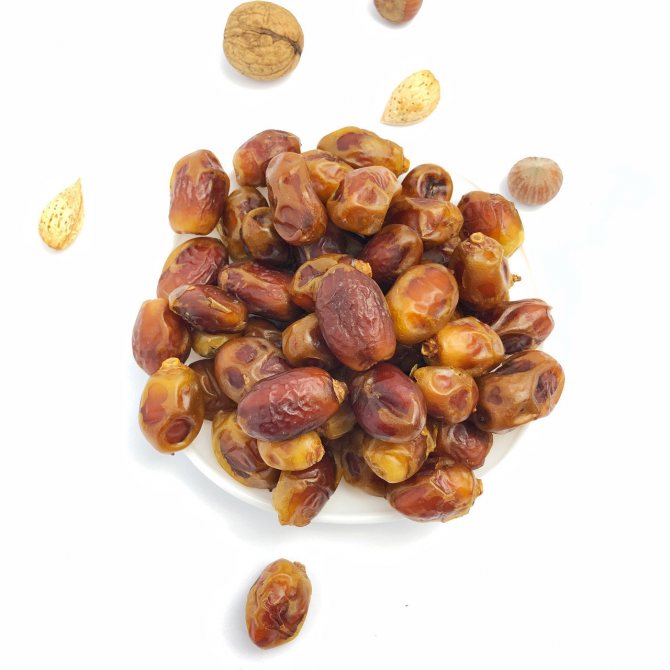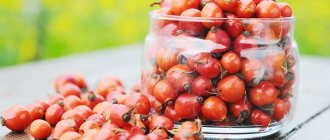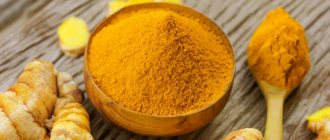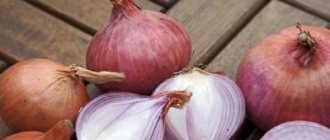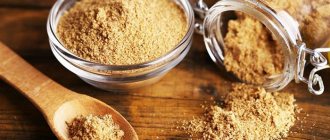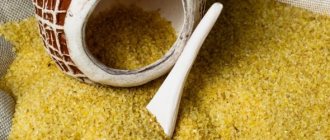History and properties of the fruit
Since ancient times, these fruits have been highly valued, as they contain many useful elements. In times of famine, people could live on dates and water for weeks and remain viable.
Despite the fact that the date is the fruit of a palm tree, that is, an exotic tree for our latitudes, it is not an allergen. What benefits will consuming dates bring during lactation?
- It has a high energy value, with only 0.5% fat. An excellent product for maintaining strength and maintaining your figure.
- Contains calcium doubly necessary for the mother's body.
- Magnesium strengthens the nervous system and promotes healthy sleep.
- Ascorbic acid strengthens the body's immune forces, which are also weakened after childbirth.
- Retinol helps improve skin condition and has a beneficial effect on vision.
- The iron in the composition will prevent anemia, anemia, and increase the level of hemoglobin.
- Saturates the body with useful minerals such as selenium, copper, phosphorus, fluorine, cobalt.
- Pectin has a beneficial effect on intestinal microflora.
Important! All useful elements not only have a beneficial effect on the mother’s body, but also enter the milk and nourish the child.
Effect on lactation
We have outlined the general properties of dates; they will be useful for both women and men. However, according to many doctors, these fruits also affect lactation itself. The fact is that milk flow is influenced by the hormone oxytocin. Eating dates helps:
- Oxytocin is produced and is associated with a feeling of calm.
- While feeding the baby, it enters the mammary glands, relaxing their ducts, accelerating the flow of milk.
- Oxytocin also enters the baby's body, which makes him calmer and more balanced.
Important! Dates, like other dried fruits, improve milk flow, but another hormone, prolactin, is responsible for its production.
Contraindications and features of consuming dates during lactation
100 g of dried fruit contains 274 kcal - this is not much, but they contain a large amount of carbohydrates. If you tend to be overweight, you should limit the amount of fruit you eat so that you don’t have to struggle with extra pounds later. Carbohydrates from dates are quickly absorbed and converted into energy that needs to be used somewhere.
At the same time, dates, like other dried fruits, are recommended as a snack for those who adhere to healthy eating rules - they are a tasty and healthy alternative to candy, cakes and other unhealthy sweets. The main thing is to know when to stop!
There are some contraindications; fruits should not be consumed:
- for disorders of the pancreas, pancreatitis;
- for diabetes mellitus;
- for certain intestinal diseases (colitis);
- for gastric ulcers;
- for liver diseases.
The norms for each woman are individual. On average, you can consume from 3 to 7 fruits per day (maximum 10) - this amount provides the daily requirement of substances and vitamins contained in dates. You should like the delicacy, you shouldn’t eat it forcefully - if for some reason your body doesn’t accept dates, you should listen.
The right fruits and options for their use
Dates during breastfeeding should be of high quality. Mom must understand that all foods in her diet cannot be chemically processed. Choose natural, unprocessed fruits:
- They will not shine (sugar syrup usually gives them an appetizing look),
- A good product should have a matte color.
- Fresh dates should be soft.
In the summer months, dried dates are useful; you are less likely to buy fruit spoiled in the heat.
By the way, you can dry fresh dates yourself. This can be done using a dehydrator or simply by placing it on the sunny side of the window. During drying, fruits need to be turned over and their condition monitored.

These sweet fruits can be eaten as a dessert in their pure form, the main thing is to rinse them well before eating. Also, if the baby reacts well to cow's milk, then the fruit is washed down with it. This combination promotes the production of substances needed by the body and helps its recovery.
On the other hand, dates are an ingredient in many dishes. It is added to:
Perhaps, of all the above, the most unusual items are hot dishes and salads. Therefore, we offer you a couple of recipes.
This is a real vitamin bomb. To prepare, grate carrots (4 small root vegetables) on a coarse grater, 100 g. Cut the dates into strips and mix. The dressing plays a decisive role here; it consists of lemon juice, honey, salt, pepper and ground ginger. Honey is prohibited for nursing mothers, so you can exclude it from the recipe or use regular sour cream for dressing.
Take 600 gr. white cabbage, 400 gr. dates and 1 cup raisins. Shred the cabbage thinly and add a little salt, wash and chop the dates, soften the raisins in boiling water. Mix all ingredients in a salad bowl.
Next, make the dressing: 1 tbsp. l. mix sour cream with 1 tsp. sugar, add a little lemon juice and a dash of curry.
You will need 0.5 kg thigh fillet, 1 onion, 1 chili pepper, 1 package of dates, dry red wine and spices to taste.
Fry the fillet until golden brown, but note that only the outside of the chicken should be cooked. Finely chop the onion, pepper and dates, add to the chicken and add spices.
Next, pour dry red wine and water over everything (mommies, don’t be afraid, all the alcohol will disappear), simmer over low heat for 30 minutes. In the original recipe, you can add a little cinnamon and honey, but these products are not recommended for lactation.
As you can see, there are many recipes for cooking dates. This is a truly universal product that solves all problems that work during GW. This is a tasty and healthy treat if eaten in moderation.
The birth of a child brings incredible changes to a woman’s life, and they also affect her diet. This does not mean that you should only eat soup with water; there are many tasty and, most importantly, healthy foods. During breastfeeding, dates solve not only the problem of saturating the body with vitamins.
Individual intolerance to fruits
As with any product, dates during breastfeeding may cause an allergic reaction in the mother or baby, although the fetus itself is not considered highly allergenic (for more details, see the article: antihistamines for allergies during breastfeeding). This is especially true for mothers and children who have already developed food allergies. If the mother knows for sure that she does not have a reaction to the fruit, then it is necessary to rule out intolerance in the baby, especially in children in the first month of life - for this, the woman eats one fruit in the morning and observes the baby’s reaction throughout the day. Allergies can manifest as reddened cheeks or a rash on the body; upset stools, bloating, and intestinal colic may also occur. If there is no reaction, you need to increase the dose of dates gradually, constantly monitoring the child’s condition. If you have the slightest doubt, you should contact your pediatrician.
Dates are a healthy product in the diet of a nursing mother. When first used during feeding, you should eat no more than 1 fruit and observe the child’s reaction to the new product. If there is no allergy, a nursing mother can eat up to 7 fruits per day. The correct choice of dates plays an important role - if the product is treated with chemicals, then you should not expect any benefits from it.
Since ancient times, it was believed that dates prolong life, and it is not surprising: they contain so many nutrients and healing substances that they were even included in the soldiers’ diet during long campaigns. If a young mother eats dates when feeding her newborn, this, according to many experts, makes milk truly priceless. Let's look at the benefits of fruits, whether they can cause any harm, and how many of them you can eat per day.
Useful properties and composition
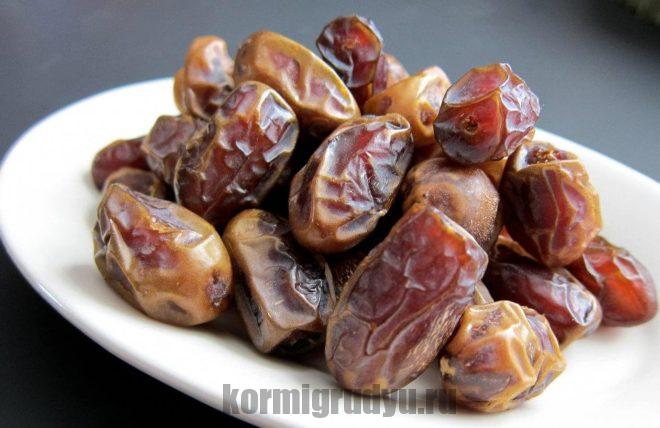
Date palm fruits have a unique chemical composition. They contain a lot of carbohydrates (up to 70%), practically no fat. Dates contain proteins, dietary fiber, and natural sugar, which are quickly metabolized and enter the bloodstream. There is ash and saturated/unsaturated acids in small quantities. Among the vitamins that are included in the composition, PP, E, B5 stand out.
Dates are good for snacking not only due to carbohydrates, but also due to the presence of iron, calcium, magnesium, and potassium. A young mother often does not have time for a full lunch; she should always have food that satisfies her hunger. When consumed regularly, dates have a positive effect on the body [1] [2]:
- have antioxidant and antimutagenic properties;
- fruits demonstrate activity in removing free radicals (the risk of oncology is reduced);
- prevent the formation of kidney stones;
- A decoction of 7 dates (taken twice a day for 15 days) is considered a diuretic;
- neutralize the hemolytic activity of streptococcal exotoxin and streptolysin O;
- a recent study also demonstrated the immunomodulatory and immunostimulatory activities of date fruit extracts.
If there are problems with the functioning of the liver, pancreas, or a stomach ulcer is detected, you should abstain from dates. Due to its beneficial properties, the fruits are included in the diet of people who have experienced blood loss or are undergoing rehabilitation after a serious illness.
Is it possible to eat dates while breastfeeding in the first month?

Dates are not on the list of prohibited foods when breastfeeding, that is, they can be consumed after making sure that the child and mother do not have allergies or individual intolerance to the fruit.
Dates not only strengthen the mother's body, but also promote the production of oxytocin. This hormone appears in the body in large quantities during labor, then it is maintained at the required level due to the fact that the baby suckles.
If a woman gives birth by caesarean section, she is given additional oxytocin to trigger natural processes, including relaxation of the milk ducts and contractions of the uterus. If milk comes out of the ducts well, the child is full, and there will be no stagnation in the glands. The more milk a child eats, the more intensively it is produced.
Most of the beneficial substances from dates pass into mother's milk, and from there to the baby. They also have a beneficial effect on the baby: he becomes calmer and his immune system is strengthened. Dates are recommended for children who have digestive problems, although everything is individual: in very rare cases, the fruits can cause allergies.
During the first 2-3 months of breastfeeding, you should be careful about your diet. Not all foods may be suitable for a child, but this does not mean that you need to stop eating foods rich in vitamins and other useful elements. You need to start with a piece of date, look at the baby’s reaction: if no rashes appear on the child’s body, the stool has not worsened, you can safely eat, but in limited quantities.
The daily norm for a breastfeeding mother is 3-5 fruits. It is important to choose edible fruits that are not treated with chemicals. Fruits must be washed, even if they have not been treated with anything harmful; the fruits have passed through dozens of hands during collection, packaging, and transportation. The fruits are washed several times in drinking water. It is permissible to soak them for 15 minutes, then drain the water and rinse again.
The first 4 weeks of their life, children are called newborns, they are just beginning to live outside their mother. Many functions of their body are formed, including sucking and digestion. While in the womb, the child already swallowed water, but this can hardly be called complete nutrition. A newborn's esophagus is only 10 centimeters long, and the stomach capacity is about 20 milliliters. Mother's milk is best suited for him to digest.
A large number of dates eaten by mom can lead to longer digestion. In addition, they contain protein that gets into the milk and can cause allergies.
Possibility of allergic reactions
Can fruits cause allergies? In some cases, yes, especially if the mother or child has a tendency to react to food. That is why, if a mother wants to eat dried fruits, she needs to start with the minimum “dosage”. Only by trying can you understand whether a given product is harmful to a child.
- Albina's review: “I only ate a couple of dates, but my son developed diathesis on his cheeks. At first I doubted: there could be a reaction to some other food. But a week later I risked trying again, and the child’s diathesis began again.”
- Maria’s review: “I didn’t even think about whether a nursing mother could have dates. I started as soon as I left the maternity hospital - I love them so much. I eat at least 20 pieces every day. My daughter is two weeks old and hasn’t had any allergies or tummy problems yet.”
Obviously, everything depends on the individual characteristics of the infants. But in any case, not a single pediatrician will advise eating too much, especially while the child is still very small (for example, in the first month). Particular care should be taken if the baby already has any health problems, including food allergies. This is a serious reason to consult a doctor.
Recommendations: First, eat one fruit in the morning. Then during the day you can observe how the child reacts. He may experience colic, flatulence, and redness on the skin.
In general, how many dates can you eat? The maximum serving is considered to be 10 pieces, but in order to avoid the baby’s poor health, it is strongly recommended that a nursing mother eat half as much. Experts consider the optimal amount to be 5-6 fruits per day - this is the daily norm, “supplying” all the necessary nutrients to mother and child. When wondering whether a nursing mother can eat dates, it is worth keeping in mind the key concepts: be prudent and know when to stop.
It is in the first months of breastfeeding that you should be especially selective about food. Many questions arise. One of them: “Is it possible to have dates while breastfeeding, what benefits do they give to the body. And what is the calorie content of dried dates?
The ancient Egyptians harvested date palms, dried them and dried them. The wandering tribes of the Arabian deserts did the same; they valued these fruits on a par with flour cakes and believed that they could live on dates with clean water for several months. When choosing any product, a nursing mother should proceed from the fact that what is consumed should not only be tasty, but also healthy, and of course not be a harmful allergen for the baby. Let's take a closer look at the benefits and harms of dates for the body of a nursing mother.
Selection of quality dates for a nursing mother
The best dates are those that are ripe and dried on the tree. When purchasing, it is important to pay attention to the following nuances:
- Appearance. The tone of the peel is dark brown, matte.
- Peel integrity. The surface should not have cracks, which indicate improper drying: the product will not be particularly tasty, and it may contain harmful microorganisms. The presence of holes means that the product contains larvae.
- Presence of a bone. A seedless product may contain harmful microorganisms and insect larvae.
- Density. Too soft fruits contain excess moisture inside, and very hard ones are made from unripe fruits.
- Aroma. There should be no foreign smell reminiscent of fuel: this means that the product was treated with chemicals to speed up drying and kill pests.
- Emptiness under the peel is a sign that the product is overripe and its taste is worse.
- Sugar indicates long storage of the product and its improper transportation.
It is better not to purchase a product that raises doubts. A small child will eat it together with his mother, and chemicals, mold, and harmful microorganisms are contraindicated for him.
Dried dates contain quite a lot of useful substances, which is why they are valued by people. But when purchasing such fruits, you need to be very careful, because some manufacturers and supermarket owners treat them with sulfur dioxide: it increases shelf life, but is harmful to the body.
- Dried dates should have a smooth, slightly wrinkled surface: overdried fruits have virtually no benefit.
- If they shine, they are covered with sweet syrup: this is how they try to hide external defects and add a sweet taste to the spoiled goods. The disadvantage of such processing is not only that unscrupulous sellers want to sell goods of dubious quality, such fruits collect dust and debris.
It is easy to find out that the surface is coated with syrup. You need to lean it against a plastic bag and see: if it sticks easily, then it could not have been done without treatment.
Composition and beneficial properties
It is useful to include a small amount of dates in your diet. Dried fruit affects important organ systems, helping to improve their functionality. To ensure the benefits, you need to consider the rich composition of the fruit. This will help answer the question of whether a nursing mother can eat dates.
What dried fruits contain:
- Trypotophan.
- Glutamic acid.
- Selenium.
- Vitamins A, B1, B2, B5, K, E, B9, B6.
- Calcium, Magnesium, Sodium, Phosphorus.
Important! They contain a large amount of useful substances. However, their carbohydrate content is higher than in fresh fruits. Therefore, deciding whether it is possible to eat finches while breastfeeding requires consideration of the characteristics of the body.
Benefits for the body:
- They give energy to the body, this is especially important for mothers at the stage of transition to a new regime and recovery.
- They contain a lot of fiber. Top up the day
- it is easy for them to set a clear standard. Thanks to this, the gastrointestinal tract functions normally, and the risk of hemorrhoids and cancer is reduced significantly.
- Dates are a natural antibiotic! They will help a woman if she develops inflammatory diseases after childbirth.
- Microelements from fruits help strengthen teeth and bones. Their weakening is a common problem for young mothers.
- The product lowers blood pressure.
- Eating fruits helps maintain youthful and beautiful skin.
- Including fruits in the diet prevents anemia, so they are useful even before childbirth.
- Microelements of the product reduce the intensity of allergic manifestations.
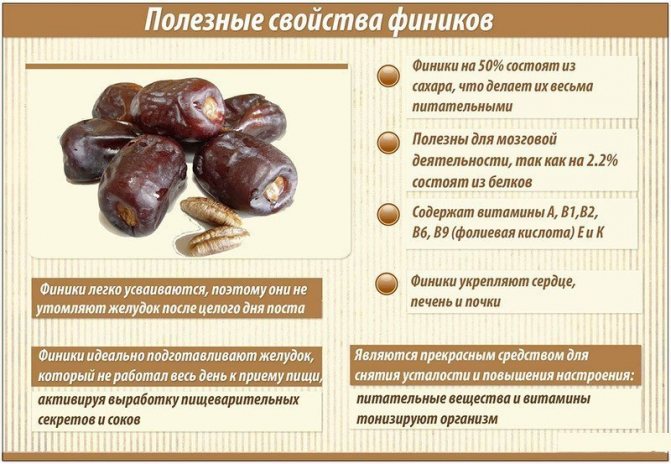
Composition and properties of dates
Date palm fruits contain:
- carbohydrates – about 88% (sucrose, fructose, glucose), which determines the high nutritional value;
- a large number of mineral elements (magnesium, sulfur, potassium, selenium, sodium, cobalt, phosphorus, copper, iron, fluorine);
- vitamins (A, ascorbic acid, B vitamins);
- pectin;
- fats – no more than 0.5%.
Regular consumption of dates has the following effects on the body:
- the work of the excretory and cardiovascular systems is improved;
- the performance of the brain increases, so it is useful to include dried dates in the diet of schoolchildren;
- the skeletal system is strengthened;
- the functioning of the digestive system is normalized;
- mechanisms of rejuvenation and self-healing of the body are launched due to the growth of new cells - this is especially important in the postpartum period and after illnesses;
- normal intestinal microflora is restored;
- the body’s protective properties are enhanced – immunity increases;
- the risk of cancer cells is reduced;
- The overall tone of the body increases, the mood improves, and the depressive state goes away.
When breastfeeding, all the beneficial substances from dates reach the baby - the baby becomes calmer, and his health improves. Dates are especially useful for babies who have problems with the digestive system; they also have a beneficial effect on overall immunity. Conclusion: a nursing mother can and should eat dates.
Effect on lactation
Dates during breastfeeding have a positive effect on a woman’s body, helping it recover after the birth of a child. This makes breastfeeding easier. Fruits directly affect the lactation process. The substances contained inside increase the production of a hormone important for mothers - oxytocin.
It is oxytocin that stimulates milk production! After giving birth, a woman is recommended to eat foods, do exercises, and apply useful tips that help its production. Eating dates is an important point.
When feeding begins, oxytocin is released on its own. It calms and relaxes. The milk ducts relax. The mammary gland fills faster. The outflow is increasing. A feeling of fullness comes quickly. The milk becomes rich and healthy.
Important! Dates during feeding affect the outflow, but do not significantly increase the amount of milk.

What else are dried dates useful for nursing mothers?
The bioflavonoids contained in dates help regulate proper metabolism in the body and the production of necessary hormones. Hormones are responsible for the presence of excess weight, the production of the required amount of milk, and much more.
- Melatonin prevents postpartum depression.
- Serotonin is a well-known hormone for promoting high mood.
- Oxytocin is the most important hormone for nursing mothers, present in dates. It is responsible for contracting the uterine muscles and producing the required amount of milk for the baby. The presence of oxytocin alone allows us to answer in the affirmative the question of whether dates can be consumed while breastfeeding.
- Pectin, which is also abundant in apples, reduces bad cholesterol.
Analyzing the benefits and harms of dates for the body of a nursing mother, we have so far discussed only the advantages. There are also disadvantages to the frequent use of this delicious, sweet fruit for some people.
Photo of dried dates with peach for nursing mothers
Harm from dates - contraindications
It is worth realizing that with regular use, both the benefits and harms of dates for the body are noticeable. We are not talking about a situation where you ate several pieces every half a year. To whom are dates harmful if eaten regularly? We are talking about people with disabilities:
- The work of the liver, suffering from hepatitis,
- Works of the pancreas. Who has pancreatitis and any form of diabetes mellitus,
- Disorders in the gastrointestinal tract. These are various gastritis, stomach ulcers, colitis.
Now you know both the benefits and harms of dates for the body.
I hope that reading this article will encourage you to get into the habit of buying at least 200-300 grams of these oblong “delicacies” from today.
Effect on the baby
Infancy with dried fruits in childhood occurs at 10-12 months. But the baby can receive useful substances from the fruits much earlier. Everything that the mother receives from food is eaten by the child. Having assessed the effect, you can understand whether dates can be consumed while breastfeeding in the first month of lactation.
How dates affect infants during breastfeeding:
- It contains more calcium than many other fruits. Combined with Magnesium, the element helps form the baby’s skeleton.
- Potassium has a positive effect on the functionality and development of the brain. The child begins to grow faster and develop well.
- Finnish cats are faithful intestinal helpers. Natural antibiotic disinfects. At the same time, beneficial bacteria remain and the microflora is not disturbed. Eating dates while breastfeeding is a way to avoid dysbiosis.
- Pediatricians advise mothers and children to eat dates to avoid typhoid, hepatitis, and jaundice.
- If the fight against constipation is prolonged, the diet is replenished with dates. They improve peristalsis.
- Puree helps in the prevention of dysentery.
- A large amount of vitamin A is responsible for improving vision.
- The fruit increases hemoglobin.
- If the baby does not gain weight, they begin to eat dried fruit. And the indicators quickly return to normal.
- Milk becomes nutritious, the newborn baby is nourished and calms down.
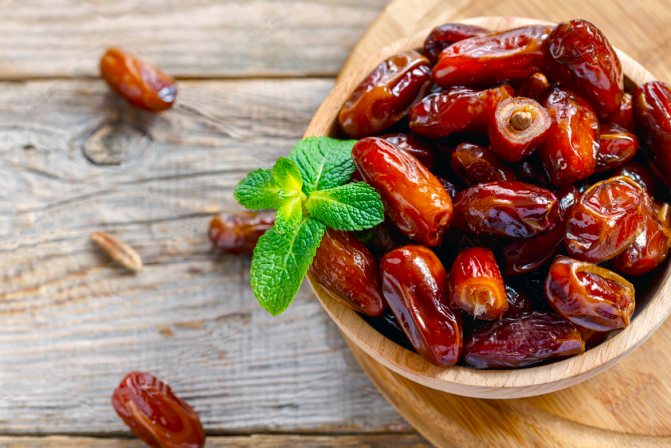
Basic properties of dates
The exceptionally beneficial properties of date palm fruits are beyond doubt. They contain:
- only about 0.5% fat;
- about 88% of carbohydrates are fructose, glucose, sucrose;
- minerals, including potassium, magnesium, selenium, sulfur, copper, phosphorus, sodium, cobalt, fluorine, iron;
- vitamins: A, C, many from group B;
- pectin.
Dried fruits, and dates in particular, can be recommended for breastfeeding precisely because they contain a lot of compounds that are beneficial to the body. Thanks to them dates:
- regulate the functions of the kidneys, heart, liver, brain;
- strengthen bones;
- enhance the growth of new cells;
- contribute to the normalization of the gastrointestinal tract and the development of intestinal microflora;
- increase immunity and allow you to recover faster - even after serious illnesses or significant blood loss;
- have a strong antioxidant effect, reducing the risk of developing atypical cells;
- improve mood, help cope with depression and even prevent nervous breakdowns.
Can you eat dates while breastfeeding? Obviously, all of the above also applies to the child’s body: the baby will become calm, healthy, and will develop correctly and in a timely manner. Let's consider further how dried fruits affect breastfeeding.
Introduction to diet and use
Immediately after the first days of breastfeeding, most foods are introduced gradually. This helps to avoid problems with the gastrointestinal tract, allergic reactions, and other health problems. Young mothers are recommended to use the entry rules.
How to introduce into a mother’s diet during breastfeeding:
- The first use is limited to 2 pieces in the morning.
- After the first breastfeeding, the baby's reaction is assessed. This is a new product for an unformed organism. Provided that there are no allergies and the gastrointestinal tract is functioning normally, the fruits are left on the menu.
- Pediatricians recommend consuming dates not on their own. A useful supplement is dairy products. Taking dates with milk in the morning increases the amount of milk produced by feeding time. This is healthy and can replace unhealthy desserts.
- At first, it is advisable to add the product to compotes, jelly, herbal and fruit teas.
- The fruits are added to salads and healthy desserts before being fed with milk.
- If redness, anxiety, constipation and diarrhea appear in the baby, the new fruit is excluded from the menu. The next attempt at administration is repeated with the permission of the pediatrician.
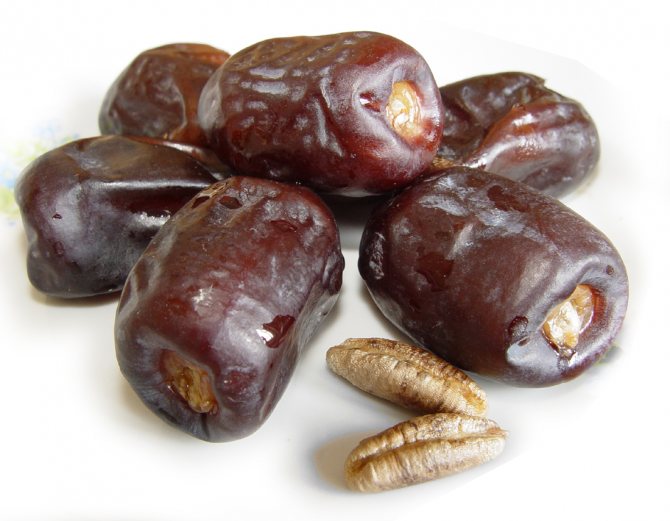
Possible harm
The fruits of the date palm belong to protein products, so you should not abuse them if you have a history of diseases:
- liver;
- stomach and duodenal ulcers;
- colitis.
It is not recommended to consume the fruit if you have pancreatic diseases or diabetes.
Don't lose sight of the quality of the product. Some date fruits may be treated with sulfur dioxide, and the chemicals are contraindicated during breastfeeding. This is a toxic component and its entry into the body can contribute to the destruction of the digestive tube. Constant consumption of foods treated with sulfur dioxide leads to the development of ulcers.

In addition to harming the mother, sulfur dioxide can also harm the baby. It is important to take a responsible approach to purchasing dried fruits. Under no circumstances should you purchase dates from your hands, in stalls or in places with poor sanitary conditions.
How to introduce it into the diet
Dates can be introduced into the diet after childbirth, but the dose should be minimal. After studying the baby’s reaction to a new product and receiving information about the absence of a reaction, it is not forbidden to consume the fruit every day.
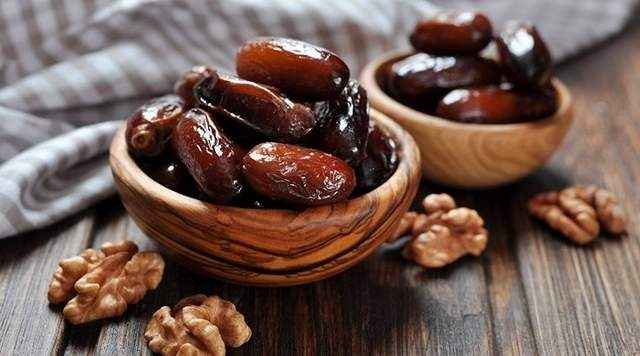
In order for date fruits to bring the maximum beneficial effect, you need to follow small rules:
- The product should be purchased from reputable places.
- You should not get carried away with the active consumption of dates; it is advisable not to eat more than prescribed.
- Dates must be washed before eating.
Selection of quality dates
Dates will have a positive effect only if they are of high quality, not treated with chemicals, and have retained the maximum amount of nutrients. Therefore, you need to learn how to choose fruits before introducing them into your diet.
What to look for when purchasing:
- The color of good fruits is brown. The shade is dark. The surface is matte. Shine is a sign of processing to preserve shelf life and attract buyers.
- A sign of fruit surface treatment is a sticky coating, dust adhesion.
- You cannot take cracked fruits. Through damage to the skin, harmful organisms enter and begin their life activity.
- You should dig up the dates with pits. The absence of a hole through which it is taken out ensures that harmful organisms do not get inside.
- Dates do not smell like chemicals. The presence of a characteristic odor should alert you.
- Empties in the skin are a sign of overripe fruits; they are tasteless and have lost some of their nutrients.
- The candied surface indicates long storage of the fruit. They're not fresh.
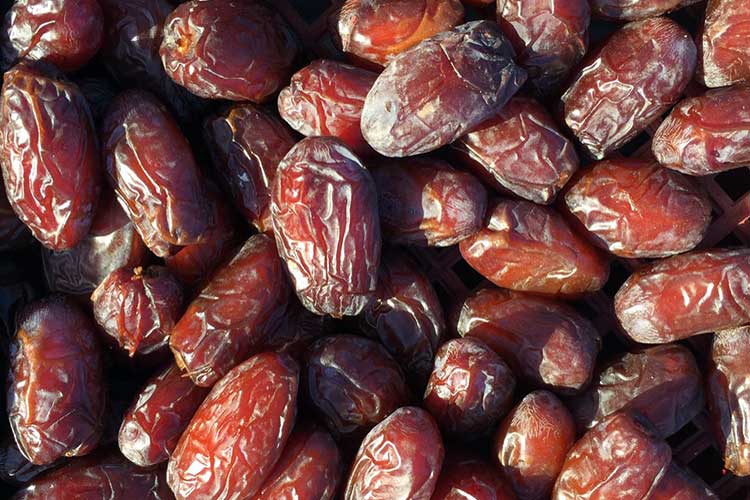
Dried dates
To avoid buying low-quality contaminated dates, it is advisable to prepare them at home. This is a guarantee of product safety. In production, after harvesting, the fruits are placed on plantations and buried in sand. Unscrupulous manufacturers treat the surface with chemicals for preservation.
At home, palm fruits take a long time to dry. They are placed in the shade. This helps maintain the softness of the dried fruit. And the sun will make it hard. If there is no time, the product is sent to the oven. Then you should use it quickly, as the skin will crack. Microorganisms will get into it.
Important! In production, glycerin, palm oil, liquid smoke, and chemicals that are more dangerous for the body of mother and baby are used for processing.
Dates and the first month of GW
Women ask doctors whether a nursing mother can eat dates during the first month of breastfeeding. Already this time is accompanied by the gradual introduction of exotic dried fruit. This is a vulnerable age for the baby. Therefore, the introduction should be deliberate and gradual. It is recommended to discuss the permitted amount with your pediatrician.
Starting with two pieces, by the end of the month you should consume no more than 7 fruits per day. At the same time, the daily norm increases gradually. The child is monitored for most of the month, during which time the number is minimal. In the second half it increases gradually to 7 pieces.
